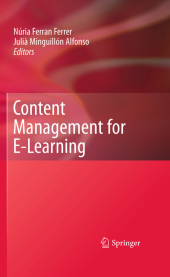 Neuerscheinungen 2014Stand: 2020-02-01 |
Schnellsuche
ISBN/Stichwort/Autor
|
Herderstraße 10
10625 Berlin
Tel.: 030 315 714 16
Fax 030 315 714 14
info@buchspektrum.de |

Julià Minguillón Alfonso, Núria Ferran Ferrer
(Beteiligte)
Content Management for E-Learning
Herausgegeben von Ferrer, Núria Ferran; Alfonso, Julià Minguillón
2011. 2014. xiv, 215 S. 235 mm
Verlag/Jahr: SPRINGER, BERLIN; SPRINGER NEW YORK; SPRINGER 2014
ISBN: 1-489-99271-5 (1489992715)
Neue ISBN: 978-1-489-99271-0 (9781489992710)
Preis und Lieferzeit: Bitte klicken
The rise in the use of e-learning environments has brought new challenges to academic institutions. This book addresses content management in the e-learning sector from both theoretic and pragmatic approaches. Case studies and practical solutions are provided.
The increasing growth in the use of e-learning environments, in which education is delivered and supported through information and communication technologies, has brought new challenges to academic institutions. From all the current definitions of e-learning, it can be seen that learning contents are one of the key issues for a successful e-learning experience. Therefore, there is a real need for academic staff, managers and librarians to re-think the whole process of delivering courses, information resources and information services.
The book focuses on defining content management and its relationship with knowledge management, providing perspectives on how the semantic web could complement content management, how to deal with copyright restrictions, and how to describe information competencies and skills required and acquired by teachers and students in virtual environments. Offered is a design project for managing digital content for classical and distance education institutions, covering all the aspects related to the content lifecycle, integrating it into the learning process. Practical aspects such as standards for content e-learning management, a review of existing experiences of learning repositories, and a survey of available platforms for delivering courses and providing access to information resources is also covered. Lastly, the book addresses the three main factors which make it crucial in the current context: first, the web 2.0 paradigm, which breaks the content producer-consumer barrier; second, the open content movement for educational purposes, which changes the knowledge management transference model; and third, the new European Higher Education Area, where the concept of content needs to be rethought.
Introduction.- PART I: Conceptual framework.- 1. Theoretical perspectives on content management.- 2. From content management to e-learning content repositories.- 3. Learning Objects, Content Management and E-learning.- 4. Relationship between Pedagogical Design and Content Management in eLearning.- 5. Information related competences for teachers and students in e-learning environments.- 6. Copyright issues in e-learning.- PART II: Case studies and practical issues.- 7. Developing content management projects.- 8. Survey on learning content management systems.- 9. e-Learning standards for content management.- 10. Quality issues and strategies for evaluation.- 11. Open Educational Resources: Motivations, Logistics and Sustainability.- CONCLUSIONS: Content management and e-learning: a strategic management perspective.


